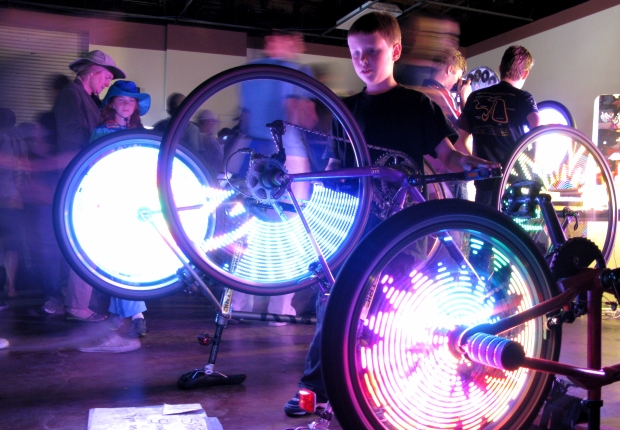I am very pleased to be a partner in an EU-funded project, ‘Digital Do-It-Yourself’ (DiDIY for short). It brings together lots of interesting people and ideas, and starts in early 2015. Here’s the description:
Digital Do-It-Yourself (DiDIY) is a new phenomenon which stems from the widespread availability of digital devices that support the convergence of physical and information components – the coming together of ‘atoms’ and ‘bits’ – through technologies such as 3D printers and Arduino boards, combined with the growing accessibility of related knowledge and data through open online communities. This can lead to the emergence of new scenarios in the roles and relations among individuals, organizations, and society, in which the distinction between users and producers of physical artefacts is blurred, and new opportunities and threats emerge accordingly.
DiDIY-related technologies and social practices enable the low cost prototyping and manufacturing of physical artefacts from digital specifications. These tools and practices are emerging as effective amplifiers for the creativity and skills of individuals, who can affordably develop “digitally self-made” objects, including such diverse options as extreme customization (“unique-by-design” objects designed by 3D modelling software and generated by a 3D printer) and context-aware, networked interactivity (“smart” objects that can sense and respond to their environments). This layer of physical production is supported by the intense learning and creative conversation which can develop in online spaces, and also by the significant amount of second-order DiDIY – online connections developing ideas and opportunities for offline making.
In this novel, engaging, systemic context that is emerging, this Project has the twofold objective:
(i) to establish a conceptual framework that will enable the analysis, exploration and understanding of the impact of DIY in a human-centric digital age, and
(ii) to produce well-founded transferable information, models and guidelines to support both education and policy making on DiDIY as it is forming, intended as an ongoing phenomenon that, while surely enabled by technology, should be driven and shaped by social and cultural strategies, not technology.
As a multidimensional phenomenon, DiDIY will be studied in the Project according to multiple perspectives, including how it is reshaping
(1) organization and work, and
(2) education and research,
and how it is impacting on
(3) creative society and
(4) legal systems,
and with transversal viewpoints on the ways in which DiDIY is changing
(5) creative design and
(6) ethics.
The project is led by Professor Luca Mari, of Università Carlo Cattaneo (LIUC), Castellanza, Italy, a specialist in measurement science, statistical data analysis, and system theory. He heads Lab#ID (lab on RFId Systems) and SmartUp (lab on digital prototyping technologies).
The other key partners are:
→ Professor David Gauntlett, University of Westminster, London, UK [me!]
— specialist in social dimensions of creativity and digital media
→ Enrico D’Amico, Ab.Acus, Milan, Italy
— specialist in new technologies
→ Professor Bruce Edmonds, Manchester Metropolitan University, Manchester, UK
— specialist in modelling of social behaviour and policy
→ Wouter Tebbens, Free Knowledge Institute, Amsterdam, the Netherlands
— specialist in open knowledge principles and a free knowledge society
→ Professor Vincent Mueller, Amerikaniko Kollegio Anatolia, Pylaia, Greece
— specialist in the nature and future of computational systems
→ Dr Marita Canina, Politecnico di Milano, Milan, Italy
— specialist in design, architecture and biodesign
DiDIY is a multidisciplinary venture where interactions between partners with different profiles and backgrounds will take place intensively throughout the Project.
The project runs for 30 months from early 2015.
Image by Flickr user Steve Jurvetson (see original), used under a Creative Commons BY 2.0 licence.








I, and my business partner are both teachers. We employ university students from computer science and engineering disciplines to work with children. We are both interested in developing a curriculum that meets the needs of students but see that merely teaching coding is a quick way to fail. We instead are approaching it from a holistic viewpoint in that we see an understanding of coding being one of the tools in a toolbox that contains sensors, micro controllers and Ssoc,s like Beaglebone and Raspberry Pi, 3D printing and industrial design principles, graphic design and programming. We would be very interested in engaging in dialogue around this project and sharing any insights or experiences we have with you.
Great! Yes please! Let’s connect by email. (See https://davidgauntlett.com/contact/).